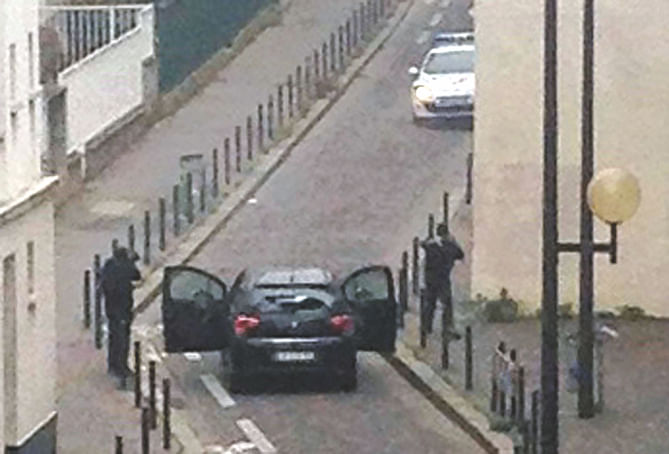Terror attack kills 12 at Paris weekly
Terror attack kills 12 at Paris weekly
Raising Islamist slogans, gunmen storm office of the satirical magazine; editor, 3 cartoonists among dead

Heavily armed men shouting "Allahu akbar" stormed the Paris headquarters of a satirical weekly yesterday, killing 12 people in an attack that brought more than 100,000 protesters onto streets across France.
The assault on the Charlie Hebdo headquarters, the worst attack in France in decades, sparked a massive manhunt as the two gunmen in black commando gear escaped, executing a wounded police officer with a shot to the head.
The men remained on the run late yesterday, with few clues on their whereabouts and parts of the French capital in lockdown.
The attack sparked global outrage and demonstrations of solidarity in several cities across Europe.
Many protesters in France carried banners reading: "I am Charlie" and the hashtag #JeSuisCharlie was trending worldwide including in Arabic.

French President Francois Hollande called the attack "an act of exceptional barbarity" and "undoubtedly a terrorist attack." He called for a day of national mourning today and said flags would fly at half-mast.
Charlie Hebdo gained notoriety in February 2006 when it reprinted cartoons of the Prophet Mohammad (PBUH) that had originally appeared in Danish daily Jyllands-Posten, causing fury across the Muslim world.
The killers screamed "we have avenged the prophet, we have killed Charlie Hebdo" according to prosecutors.
Editor-in-chief of Charlie Hebdo Stephane Charbonnier, known as Charb and who had lived under police protection after receiving death threats, was among the victims.
Others included Jean Cabut, known across France as Cabu; Georges Wolinski; and Bernard Verlhac, better known as Tignous. Also shot dead was popular economist Bernard Maris, 68, not a cartoonist but well-known for his Charlie Hebdo editorials and national radio commentaries.
The drama began in broad daylight in a quiet Paris street when the masked gunmen stormed into the weekly's offices as the journalists were in an editorial meeting, first shooting a receptionist.
They picked off eight journalists, including some of France's best-known cartoonists, a security guard and a visitor. One person survived by hiding under a table.
Chilling amateur video footage shot after the carnage then showed them outside, running toward a wounded policeman as he lay on the pavement.
One attacker says "you wanted to kill me?" before shooting the officer execution style.
Large numbers of police and ambulances rushed to the scene and shocked residents spilled into the streets. Reporters saw bullet-riddled windows and people being carried out on stretchers.
Prosecutors said 11 people were also injured in the attack, with four in critical condition.
One man who witnessed the attack described a scene like "in a movie."
"I saw them leaving and shooting. They were wearing masks. These guys were serious," said the man who declined to give his name. "At first I thought it was special forces chasing drug traffickers or something."
Authorities said their cold and calculating manner suggested they had been well-trained.
French authorities placed the Paris region on its highest alert level and beefed up security with soldiers deployed at major transport hubs.
The attack took place at a time of heightened fears in France and other European capitals over fallout from the wars in Iraq and Syria, where hundreds of European citizens have gone to fight alongside the radical Islamic State group.
Some shoppers flocking to the first day of the winter sales voiced the fears of a nation: "Have we got them yet or are they still at large? Do you think they could come here?"
Jitters were also felt in other capitals, with a media group's office in Madrid evacuated later in the day after a suspicious package was sent there.
US President Barack Obama led the global condemnation of what he called the "cowardly, evil" assault.
British Prime Minister David Cameron called it "sickening", German Chancellor Angela Merkel said the attack was "despicable" and Russian President Vladimir Putin as well as the Arab League condemned the violence.
Saudi Arabia, the home of Islam's holiest sites, condemned "this cowardly terrorist attack which is incompatible with Islam".
The imam of Drancy mosque in the northern suburbs of Paris, Hassen Chalghoumi, visited the scene, calling the shooters "barbarians, they lost their soul, sold their soul to hell".
The attacks revived fears of a return to the dark days of the 1980s and 1990s when France, which is home to Europe's largest Muslim population, was hit by a wave of extremist violence.
In 1995, a bomb in a commuter train blamed on Algerian extremists exploded at the Saint Michel metro station in Paris, killing eight and wounding 119.
Al-Qaeda inspired gunman Mohamed Merah killed seven people in and around the southern city of Toulouse in 2012. His victims included three French soldiers and four Jews -- three children and a rabbi.
Charlie Hebdo's offices were fire-bombed in November 2011 when it published a cartoon of Mohammad (PBUH) under the title "Sharia Hebdo".
Despite being taken to court under anti-racism laws, the weekly continued to publish controversial cartoons of the Muslim prophet.
In September 2012, Charlie Hebdo published cartoons of a naked Mohammad (PBUH) as violent protests were taking place in several countries over a low-budget film, titled "Innocence of Muslims", which was made in the United States and insulted the prophet.